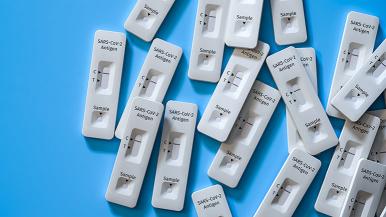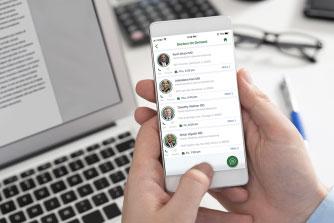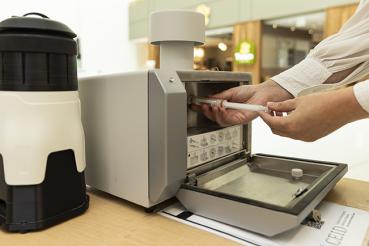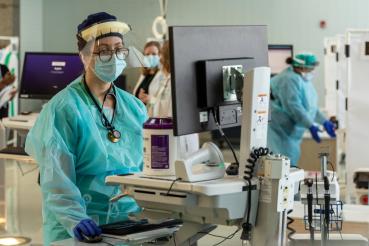Can you trust an at-home test to detect COVID-19 caused by the highly transmissible and now dominant omicron variant?
The answer is yes, although the U.S. Food and Drug Administration recently reported that at-home tests known as rapid antigen tests “may have reduced sensitivity” at detecting the omicron variant, says Mary Hayden, MD, chief of infectious diseases and the James Lowenstine Professor of Internal Medicine at Rush University Medical Center.
Omicron’s many mutations are to blame for this reduced test sensitivity. “The omicron variant has some mutation-related changes in the nucleocapsid protein, which is the target that most at-home antigen tests are designed to detect,” Hayden says. “So while I believe this is something we have to keep our eye on, I would continue to trust the results of the antigen tests, as long as they are being used correctly.” That means if an at-home test kit comes with two tests meant to be completed on consecutive days, you should complete both tests instead of relying on a single day’s result.
Before omicron, at-home tests with emergency use authorization (EUA) from the FDA were considered about 70% to 80% accurate — not quite as good as the molecular tests, also known as PCR (polymerase chain reaction) tests, that you would typically get at a hospital, clinic or pharmacy. “A PCR or laboratory-based molecular test is still the gold standard,” Hayden says.
PCR tests are typically sent to a lab, which means it takes longer to get the results compared with off-the-shelf, rapid antigen tests that give you results in minutes. During the holiday rush and amid the omicron surge, both types of tests have been difficult to get here in Chicago and around the country. (To help you track down a test, the city of Chicago has developed a website with testing information.)
Here, Hayden offers some guidance to help you determine which COVID-19 test to use in various situations.
When you have COVID-19 symptoms
The most common symptoms in people infected with the omicron variant include cough, fatigue, sore throat and congestion or a runny nose. In people who are vaccinated and get breakthrough infections with the omicron variant, symptoms may be mild, according to the Centers for Disease Control and Prevention.
If you have these symptoms or other possible signs of COVID-19 such as fever, shortness of breath or loss of smell or taste, Hayden recommends getting a PCR test if possible, even if you’ve done an antigen test at home. This can help confirm the results, whether they are positive or negative, especially because at-home tests may be less likely to detect the omicron variant. This may be especially important if you are unvaccinated, because unvaccinated people are much more likely to be infected than vaccinated people.
So why bother doing an antigen test in the first place? Getting a positive result from a rapid antigen test can help guide your next steps, such as reaching out to your doctor and taking precautions to limit your exposure to others, Hayden says.
If you’re hesitant to get a PCR test because you don’t want a long swab up your nose, there’s good news: More tests are available now that take a sample from just inside the nostrils or a bit further inside the nose. Some PCR tests also use saliva samples.
Also, if you don’t want to leave the house, some PCR tests can be done at home and mailed to a lab, with results available in a few days, Hayden says.
When you are exposed to someone with COVID-19
The CDC recently updated if you have been exposed:
- If you are vaccinated and boosted, wear a mask around others for 10 days. If possible, get tested five days after exposure.
- If you are not boosted or are unvaccinated, stay home for five days. Then, wear a mask around others for five more days. If staying home isn’t possible, wear a mask for 10 days. If possible, get tested five days after exposure.
Whatever your vaccination status, getting a PCR test over a rapid antigen test can ensure greater accuracy of the results, Hayden says. But as previously mentioned, a positive result from an at-home test can still be valuable and help you take the steps you need to care for yourself and protect others.
When you’re pressed for time
One of the downsides of many PCR tests is that you may have to wait a few days to get the results (at Rush, the turnaround time for a lab PCR test is about 48 hours). So, if an out-of-town friend or relative plans to stop by on short notice, a rapid antigen test may be helpful. “I think of testing as a thoughtful way to be considerate of each other,” Hayden says.
Still, it’s important to remember that the results of a rapid antigen test may not be as accurate as a PCR test, Hayden says. “Even with the previous variants, we know the sensitivity of the antigen tests is not as good as the sensitivity of the PCR tests for diagnosing COVID-19,” she says.
Hayden considers rapid antigen tests to be part of a layered approach to protection that also involves vaccination (including the full series with a booster), mask-wearing, hand hygiene, good indoor ventilation and physically distancing in indoor public settings.
When you need to travel abroad
Countries have different rules, so you’ll need to check to see which type of test is required and when you need to get the test before you travel, Hayden says. Many destinations, including European countries, require a negative COVID test no more than 24 hours to 72 hours before you travel.
To return to the United States by air, you must show a negative COVID-19 test taken no more than one day before your flight. This is true even if you are fully vaccinated and are a U.S. citizen.
When you need a test to return to work or school
Many workplaces and school districts have implemented their own free testing programs, which may use PCR or antigen tests. If you or a family member gets COVID-19, your employer or school may require a negative COVID-19 test (in addition to completing a quarantine at home) before you return to school or work. Because the rules vary, Hayden recommends checking with your school or employer for specifics.
When you want to visit an elderly relative or someone who is immunocompromised
Doing a rapid antigen test right before the visit may be useful when a PCR test is not practical, Hayden says. If the test is positive, reschedule the visit. If the test is negative, consider still wearing a mask and following other prevention recommendations, including social distancing, she says.
When you are headed to an indoor social gathering
Even if you are fully vaccinated, Chicago public health officials recommend getting tested right before getting together indoors with people who are not part of your household. Although a negative result doesn’t mean you don’t have an infection, it can provide another layer of protection, Hayden says.
What should you do if you test positive for COVID-19?
The CDC now recommends staying home for five days if you are positive for COVID-19, regardless of your vaccination status. If you have no symptoms or your symptoms are resolving after five days, you can leave your house (but if you have a fever, stay home until your temperature returns to normal). You should continue to wear a mask around others for five more days.
Having the following supplies on hand can help you get through it easier:
- Over-the-counter medicines like acetaminophen or ibuprofen if you have fever
- Cough medicine or cough drops to ease a sore throat
- Plenty of fluids so you stay hydrated
- Masks if you share your home with others
Also, be sure to get plenty of rest during your recovery.
Hayden recommends closely monitoring your symptoms and seeking medical care if you’re ill. Virtual visits available through RUSH can help you get the care you need as soon as possible.
What can I do to protect myself against omicron?
Hayden says getting vaccinated and boosted is still the best protection against omicron and other COVID-19 variants. “The evidence shows that vaccination still protects against serious disease, hospitalization and death due to the omicron variant,” she says. “And if you are eligible, get boosted, because a recent booster really seems to improve protection against omicron.”
She also urges Chicagoans to stay vigilant, even if they are vaccinated, during the current omicron surge. “The fact that you’re vaccinated doesn’t mean that you shouldn’t continue to be careful as we experience a high number of cases in the community,” she says.
Hayden says people shouldn’t get discouraged by recent reports of COVID-19 cases among people who have been vaccinated. “The fact that we’re seeing these breakthrough cases doesn’t mean that the vaccines have failed or are not worth getting,” she says. “You can still feel confident that you did the right thing by getting vaccinated, because you are much less likely to be hospitalized and much less likely to have severe disease due to COVID-19.”
Start the new year off right by protecting yourself and your family. Schedule your vaccine or booster today.





